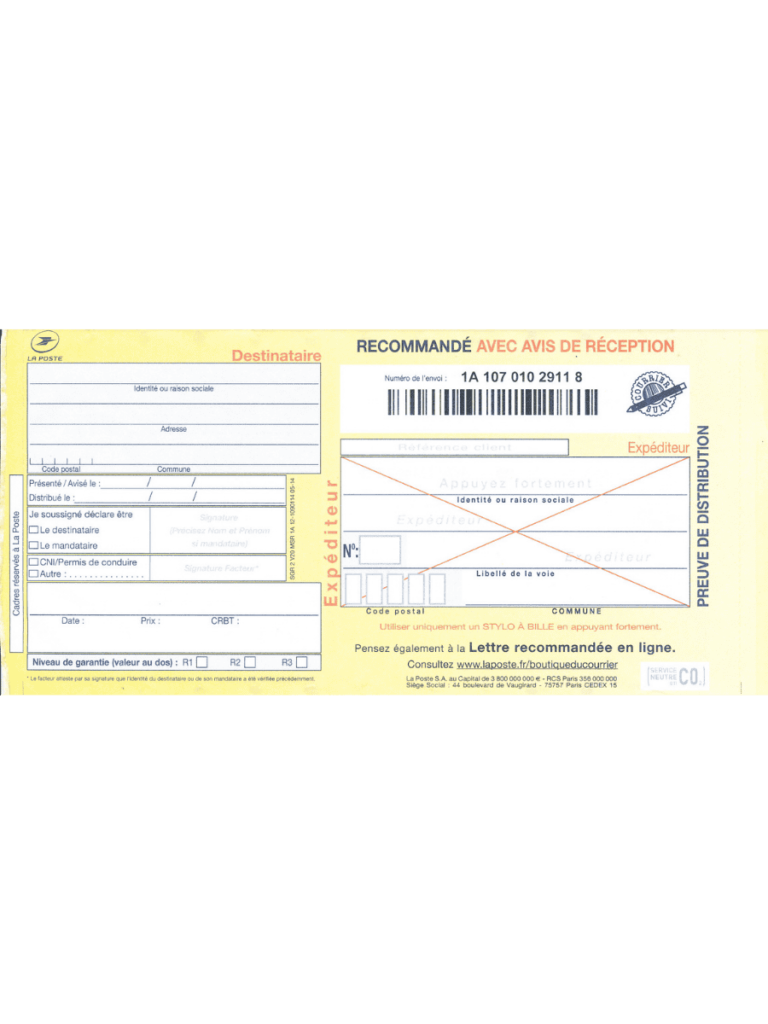Understanding the Lettre Recommandée avec accusé de réception (Registered Letter)
Wondering what is a lettre recommandée ?
If you’re navigating administrative tasks in France, you might have come across the term “lettre recommandée”. But what exactly is a lettre recommandée avec accusé de réception, and why is it important? Let’s break it down! 📨
What is a Lettre Recommandée? 🤔
A lettre recommandée (registered letter) is a secure way to send important documents through the postal service. Unlike a regular letter, a lettre recommandée provides proof that your letter was sent and received. This is crucial for official and legal communications.
Here’s how it works:
- Proof of Sending: When you send a lettre recommandée, you get a receipt as proof that it was dispatched.
- Proof of Delivery: The recipient must sign upon receiving the letter, and you get a confirmation of delivery.

What is the Accusé de Réception? 📑
An accusé de réception (receipt of acknowledgment) is a crucial part of a lettre recommandée. It’s the official document that confirms the letter was received by the recipient. This receipt can be used as evidence in legal matters or disputes.
Why Use a Lettre Recommandée? 🤝
A lettre recommandée is often used for:
- Legal Notices: Such as terminating a contract or notifying a company of a dispute.
- Important Documents: Sending sensitive documents where proof of receipt is needed.
- Formal Communication: Any communication that requires a verified record.
Using a lettre recommandée ensures that your important correspondence is handled with the highest level of accountability and traceability. 🏛️
Key Points to Remember 🔑
- A lettre recommandée provides proof of sending and proof of delivery.
- The accusé de réception is a receipt confirming that the letter was received.
- Use a lettre recommandée for important or legal communications.
By understanding what a lettre recommandée is and how it functions, you can ensure that your important documents are handled correctly and securely. 📬
FAQ❓
A lettre recommandée provides proof that a letter was sent and received, making it ideal for formal or legal communications.
An accusé de réception is a receipt confirming that the recipient has received the lettre recommandée.
While a lettre recommandée is commonly used for formal or legal matters, it can also be used for any communication where proof of receipt is necessary.
No, a lettre recommandée is different from a regular letter because it includes additional proof of sending and delivery.
Similar Posts
What is a Titre de Séjour? 🤔
ByMargauxWhat is a french Titre de Séjour? 🤔 If you’re an international student planning to study in France, one essential document you’ll need is a french titre de séjour. But what is a titre de séjour exactly? In simple terms, it’s a residence permit that allows non-European Union nationals to live and study legally in France…
What is CAF? Understanding CAF for International Students 🏢
ByMargauxUnderstanding CAF If you’re an international student in France or a resident trying to navigate the French social system, you might be asking yourself: what is CAF? The CAF (Caisse d’Allocations Familiales) plays a crucial role in providing financial assistance and benefits. Let’s break down what the CAF is all about and how it can…
How to create a CAF account ? Tutorial for International Students !
ByMargauxCreate a CAF Account: Follow Our Video Tutorial! 🎬 If you’re an international student in France, creating a CAF account is an essential step to benefit from financial aid, such as APL (Personalized Housing Assistance). But don’t worry, we’ve made a video tutorial to guide you through the process step by step. You can watch…
What is an attestation d’hébergement? 🏡
ByMargauxUnderstanding the attestation d’hébergement CAF for International Students If you’re an international student in France, you may come across the term attestation d’hébergement. But what is an attestation d’hébergement, and why do you need it? This document can be essential in various administrative processes, particularly when applying for housing assistance through CAF or setting up…
Checklist – Prepare your arrival in France !
ByMargauxDiscover the infallible checklist to prepare your arrival in france! It’s time to prepare for your arrival in France ! If the idea of navigating the French administrative maze makes you break out in a cold sweat, don’t panic! Dare&Go is here to help you. Read on as we reveal the secrets to getting your…
What is a Garant in France? 🏡
ByMargauxUnderstanding the Role of a Garant in France If you’re an international student moving to France, you’re likely to come across the term “garant” when looking for housing. So, what is a garant and why is it important when renting an apartment in France? Let’s dive into this key element of French rental agreements to…


One Comment